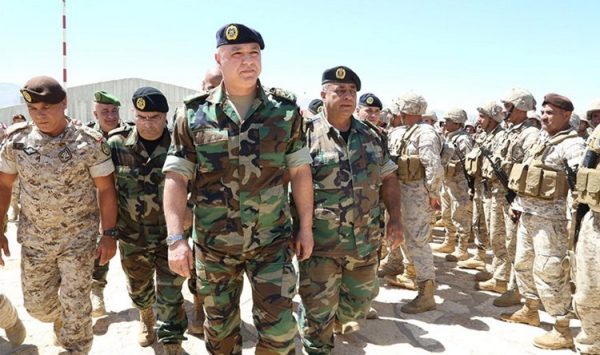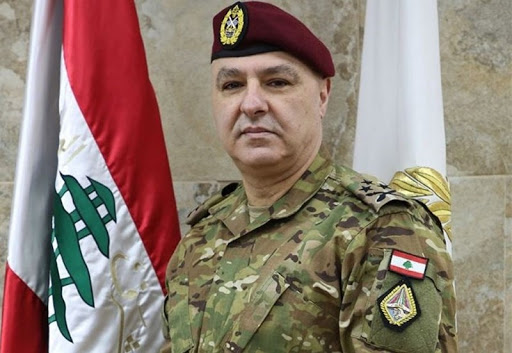
With the words “Where are you taking us,” Lebanese army commander Gen. Joseph Aoun last week addressed the country’s political elite. For the first time, the head of the military showed a confrontational attitude toward the civilian authority.
“The people are hungry and the army that is part of the people is hungry too.” That is how Aoun described the situation. The commander explained that, if the army breaks up, the existence of Lebanon as an entity will be at risk. People cheered the commander for his courage. However, his speech was not welcomed by Hezbollah. This group was never comfortable with Aoun, who it views as being too friendly toward the US. The pro-Hezbollah newspaper Al-Akhbar has always accused him of having presidential ambitions. After his speech, it published an article under the title “The coup of Joseph Aoun,” accusing him of placing himself above accountability.
The perceived presidential aspirations of any army commander are viewed with suspicion in Lebanon. Though there is nothing wrong with having such an ambition, the Lebanese have been disappointed with previous army commanders who went on to become president. Emile Lahoud and Michel Suleiman were both promoted to the presidency as “compromise candidates,” or candidates in the middle that belonged to no specific party. But those ambitious generals compromised the national interest and gave in to the political elite in order for the latter to return the favor when it came to selecting the president. This makes the Lebanese worry, especially the protesters. They are worried that the same situation could be repeated with Aoun. They worry that he will make concessions in order to fulfill his rumored presidential ambitions.
However, the commander’s speech shows very clearly that he is not courting the political elite. He cannot ask his hungry soldiers to repress hungry people to protect the corrupt elite that have driven the Lebanese people into misery.
In order to contain the military’s wrath, parliamentarian Ali Hasan Khalil, who belongs to the Amal Movement, proposed giving soldiers a monthly increase of 1 million Lebanese pounds ($662) a month for the next six months. However, the funding for this pay rise will likely come from the country’s reserves and will probably lead to more inflation and a greater deterioration of living standards.
People at large are supporting the general, but some of the “Hirak” protesters are not comfortable with his intervention. They have seen so many examples in the Arab world where the rule of a military junta brought increased clientelism, corruption and repression. Nevertheless, the protesters need to be pragmatic. They want the “thawra” (revolution) to succeed, but no revolution in history has succeeded without the help or at least the tacit acquiescence of the army. If the protesters want to reboot the Lebanese regime into a mode free from corruption, they need to engage with the army.
It is very unlikely that the groups of the Hirak alone will make the breakthrough they aim for in the next elections. The current system will ensure the survival of the elite and perpetuate the current corrupt power-sharing scheme. Expecting a different outcome in the next parliamentary elections would be similar to expecting a winner other than Bashar Assad in a presidential election in Syria. There might be some gains here and there, but there will not be enough change to get rid of the current corrupt system.
Some politicians opposing Hezbollah, like the Lebanese Forces and some groups in the Hirak, are advocating for early elections. The Lebanese Forces thinks it might be able to score gains among the Christian constituency at the expense of President Michel Aoun’s Free Patriotic Movement. To add to that, a few independents, along with the Future Movement and Walid Jumblatt, might enable the anti-Hezbollah coalition to regain a majority in parliament. But a win for the anti-Hezbollah bloc would not mean that the corrupt system can be changed. Prime Minister-designate Saad Hariri has also been swinging between the pro and anti-Hezbollah camps. There is no guarantee he will remain on the opposite side to Hezbollah. Such a change in the parliamentary majority would not be enough to ensure the reforms that are needed to get Lebanon on its feet again. A colleague who is pro-Lebanese Forces said to me: “What is the purpose if we gain a few seats and the entire country is lost?”
The only way to enable the country to rise again is to have a transitional government that will allow the space for civil society groups to emerge properly ahead of the next elections. The thawra groups should act fast, as Lebanon is living on borrowed time. As French Foreign Minister Jean-Yves Le Drian said last week, the window of opportunity before the country faces “total collapse” is closing. And no one will impose a solution from outside. Those who dream of Lebanon being helped under Chapter 7 of the UN Charter should realize that the UN will not deploy troops and take over the country. The protesters should instead think of 1952, when a transitional government was headed by the commander of the army, Fouad Chehab. This government ensured the country didn’t slip into violence, which is a likely outcome today due to the rising tensions and rampant poverty.
They should push for a transitional government of technocrats under the leadership of Gen. Aoun and protected by the army — a government that will have an administrative role and will conduct the necessary reforms to allow the country to stand on its feet again and be eligible for foreign aid. This government will prepare for elections that are free from the control of the current corrupt system. If the protesters unanimously adopt this proposition, then there is a chance the international community will support it, which could lead the political elite to yield.
The protesters and revolutionaries should realize that their only chance of success lies in some form of agreement with the army.
- Dr. Dania Koleilat Khatib is a specialist in US-Arab relations with a focus on lobbying. She is co-founder of the Research Center for Cooperation and Peace Building, a Lebanese NGO focused on Track II. She is also an affiliate scholar with the Issam Fares Institute for Public Policy and International Affairs at the American University of Beirut.
- Arab News


Leave a Reply
You must be logged in to post a comment.